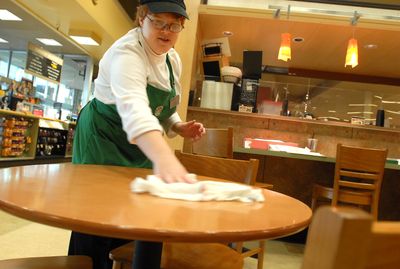A HIRE CALLING
Businesses recognize the benefits of employing people with disabilities

Michelle Collier toggles her electric wheelchair into position at checkout stand No. 1 in the Shadle Safeway store.
Another control lifts her to counter height. She sets her feet on elevated shelves and sets the plastic shopping bags where they can be easily reached.
Her first customers, a mother with two children, drop three pumpkins onto the conveyor. The largest is 18 ½ pounds. Collier lifts it and the others onto the scale, rings up the sale and says a cheerful goodbye.
A lifetime with cerebral palsy and the spiral fracture of a leg bone limit Collier’s mobility, but there is nothing wrong with her upper body strength, or her attitude. Like hundreds of other Spokane County residents who have some form or degree of disability, she shows up ready and able.
The business and social virtues of hiring a Michelle Collier or hundreds more like her in Eastern Washington was touted at the recent Hire Ability Day, an event started four years ago to introduce employers to workers with disabilities and expose more of those job candidates to the workplace.
This year’s event attracted 140 employers, the most ever, said Brian Nichols, developmental disabilities coordinator for Spokane County Community Services, the event’s main organizer. As they hear success stories from employers in and outside the Inland Northwest, more become willing to hire workers with limitations, Nichols said.
Safeway District Manager Brian Kingsbury was this year’s speaker. He noted that two-thirds of applicants with disabilities do not have jobs despite the contributions they can make to businesses. Not only are they reliable, he said, they bring into workplaces the diversity of the world outside.
Kingsbury said many also show the determination and spirit that has helped move them beyond whatever physical or mental limitations they may have. Collier is one example, Chelsi Michaelis another, and Lisa Heberling yet another.
Almost totally blind all her life, Heberling handles almost everything at the Starbuck’s kiosk in the Northwest Boulevard store in Spokane: making whipped cream, filling dispensers and pouring coffee.
Heberling said the job and the java keep her perky, and she likes the weekly paycheck.
Kingsbury said making sure Heberling understood all aspects of the job meant translating the employee handbook into Braille.
“It’s the biggest book in her house,” he said in jest.
In Michaelis, Kingsbury said, Safeway executives saw a Newport job candidate so energetic and engaging they were willing to set aside their concerns about her severe dyslexia, which vastly complicates the ordering and order-taking essential to floral sales.
The reward has been double-digit growth in sales since she took over.
“They help your top line, they help your bottom line,” Kingsbury said.
Safeway last month received the U.S. Department of Labor Spirit Award for its effort to hire the disabled. Out of a work force of 170,000, the grocery chain employs 10,000 with some form of disability.
“It just seems like this has become part of the culture and the fabric of the company,” Kingsbury said, adding that Safeway will do whatever it can to make a job fit.
In Collier’s case, Safeway bought her the chair that can be adjusted for height, and modified the checkout stand to accommodate it. An outlet allows her to charge the chair battery.
“That was very, very cool,” she said.
Collier hooked up with Safeway after almost two years of job-hunting. A Spokane native, she spent much of her adult life in Las Vegas. She worked at the Mirage for 18 years, lastly as a chef’s assistant, before deciding she didn’t want her son exposed to a 24/7 environment. Cody Collier is a senior at Mt. Spokane High School.
Collier started with Safeway as part of a crew hired to demonstrate new features and products in the chain’s remodeled stores. When that work was done, she had the opportunity to stay on if she was qualified for any openings. She landed first at the store deli and moved to checker in March after passing a test.
Collier said customers have responded well, saying they are pleased to see her in the workplace and praising Safeway for putting her there.
“They ended up being a very giving company,” she said, noting she had asked to work for the chain because a subsidiary, Vons, has stores in the Las Vegas area should she ever want to return to the Southwest.
In Kettle Falls, Harvest Foods owner and manager Dan Berger said training, counseling and other assistance from agencies like WorkSource have allowed him to hire three employees with mental impairments. He has been able to create jobs, from cleaning to stocking to gas station attendant, that match their abilities. You just have to know what to expect, he said.
Their 100 percent effort, Berger said, is better than the 75 percent put in by many other workers, although he credits his own employees for the support they show the three.
“In today’s work, very few people give 100 percent,” he said.
Coincidentally, Berger worked for Safeway for 25 years, but it was his daughter’s birth, not the Safeway culture, that rallied him to the cause of the disabled. She was fine, but the parents of another child in the same nursery, he said, wailed when their child was born with a club foot, a condition that can be corrected with surgery.
When people question why he bothers to hire the disabled, his response is, “What would you want me to do if it was your kid?’
If even a modest-sized business does not have someone with special needs on the payroll, Berger said, “They’re not even trying.”
Collier said it can be frustrating to be approached by people who see her chair, not her. But she is past that, she said.
“I never say that I’m disabled,” she said, “even though I realize that I am.”